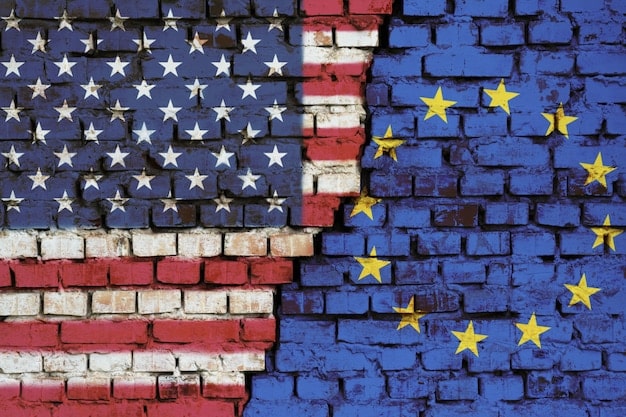US Response to European Nationalism: A Geopolitical Analysis

As nationalist movements gain traction across Europe, the United States faces the challenge of balancing its alliances, promoting democratic values, and safeguarding its strategic interests, prompting a complex and multifaceted response.
The resurgence of nationalist sentiments in Europe presents a complex challenge for American foreign policy. How Will the US Respond to the Rise of Nationalist Movements in Europe? This question demands careful consideration as the US navigates its relationships with allies while upholding its commitment to democratic values and strategic interests.
Understanding the Resurgence of Nationalism in Europe
Nationalism, a complex ideology characterized by a strong sense of national identity and loyalty, has seen a resurgence in various parts of Europe. This resurgence is driven by a confluence of factors, including economic anxieties, cultural preservation concerns, and disillusionment with traditional political establishments.
Economic Discontent and Nationalist Sentiments
Economic downturns and the perception of unfair trade practices have fueled nationalist sentiments. Many Europeans feel that globalization has led to job losses and economic inequality, leading them to support nationalist parties that promise to protect domestic industries.
Cultural Identity and the Fear of Erosion
The influx of immigrants and refugees has raised concerns about cultural identity and societal cohesion. Nationalist movements often exploit these fears, advocating for stricter immigration policies and the preservation of traditional values.

- Economic Protectionism: Nationalist movements often advocate for protectionist policies to safeguard domestic industries.
- Immigration Restriction: Stricter immigration laws and border controls are central tenets of many nationalist agendas.
- Sovereignty Assertion: Nationalist parties emphasize national sovereignty and are often critical of international organizations like the EU.
The rise of nationalism in Europe presents a multifaceted challenge, requiring a nuanced understanding of its underlying causes and potential implications. The US must carefully consider these factors as it formulates its response.
US Strategic Interests in Europe
Europe holds significant strategic importance for the United States, underpinning a complex web of economic, political, and security interests. These interests guide the US approach to the resurgence of nationalist movements across the continent.
Economic Ties and Trade Relationships
The US maintains robust economic ties with Europe, encompassing substantial trade and investment flows. Disruptions caused by nationalist policies could negatively impact these relationships and harm the global economy.
NATO Alliance and Collective Security
The North Atlantic Treaty Organization (NATO) forms the cornerstone of transatlantic security cooperation. The rise of nationalist movements, particularly those questioning NATO’s relevance, poses a challenge to this alliance.
Maintaining Stability and Preventing Conflict
The US has a vested interest in maintaining stability and preventing conflict in Europe. Nationalist tensions could destabilize the region and create opportunities for external actors to exploit divisions.
The US’s strategic interests in Europe are deeply intertwined with the continent’s stability and prosperity. A rise in nationalist movements impacts these interests directly, necessitating a measured and strategic response.
Diplomatic Strategies and Engagement
In responding to the rise of nationalist movements in Europe, the US can employ a variety of diplomatic strategies and engagement tactics to promote stability and protect its interests. These strategies revolve around fostering dialogue, reinforcing alliances, and promoting shared values.
Strengthening Alliances with Moderate Parties
The US can bolster its relationships with moderate, pro-European parties that uphold democratic values and international cooperation. By supporting these parties, the US can help counter the influence of nationalist movements.
Engaging in Dialogue with Nationalist Leaders
Diplomatic engagement with nationalist leaders is essential, although potentially controversial. This engagement can provide opportunities to understand their perspectives and advocate for responsible policies.

Promoting Democratic Values and Human Rights
The US can actively promote democratic values, human rights, and the rule of law in Europe. This includes supporting civil society organizations, independent media, and educational programs that foster tolerance and understanding.
- Reinforce Transatlantic Bonds: Emphasize the importance of transatlantic cooperation and the benefits of a strong US-Europe relationship.
- Support Democratic Institutions: Provide assistance to strengthen democratic institutions and processes in European countries.
- Counter Disinformation: Combat the spread of disinformation and propaganda that fuels nationalist sentiments.
Through strategic diplomatic engagement, the US can play a constructive role in managing the challenges posed by nationalist movements in Europe, promoting stability and safeguarding its long-term interests.
Economic Policies and Trade Relations
Economic policies and trade relations play a crucial role in how the US responds to the rise of nationalist movements in Europe. These policies can either mitigate or exacerbate the underlying economic anxieties that often fuel nationalism.
Promoting Fair Trade Practices
The US can advocate for fair trade practices that level the playing field for businesses and workers. This includes addressing issues such as currency manipulation, intellectual property theft, and unfair subsidies.
Investing in European Economies
Encouraging US investment in European economies can create jobs and stimulate economic growth. This can help alleviate economic anxieties and reduce support for nationalist parties.
Addressing Income Inequality
The US can work with European governments to address income inequality and promote economic opportunity for all citizens. This can help reduce the sense of grievance and resentment that often underlies nationalist sentiments.
Economic policies and trade relations are powerful tools that the US can leverage in responding to the rise of nationalist movements in Europe. By promoting fair trade, investing in European economies, and addressing income inequality, the US can help mitigate the economic anxieties that fuel nationalism.
Security and Military Cooperation
Security and military cooperation are essential aspects of the US response to the rise of nationalist movements in Europe. These movements can challenge the existing security architecture, requiring the US to adapt its approach.
Reaffirming NATO’s Commitment to Collective Defense
The US can reaffirm its commitment to NATO’s principle of collective defense, sending a clear message that it stands by its allies. This includes increasing military spending and conducting joint military exercises.
Strengthening Border Security and Counterterrorism Efforts
The US can work with European countries to strengthen border security and counterterrorism efforts. This can help address concerns about immigration and security that are often exploited by nationalist movements.
Addressing Russian Influence
The US can counter Russian efforts to exploit divisions in Europe and support nationalist movements. This includes exposing disinformation campaigns and imposing sanctions on individuals and entities that undermine European stability.
Security and military cooperation are critical components of the US response to the rise of nationalist movements in Europe. By reaffirming its commitment to NATO, strengthening border security, and countering Russian influence, the US can help ensure stability and security in the region.
The Role of Public Diplomacy and Soft Power
Public diplomacy and soft power can play a significant role in shaping public opinion and countering the appeal of nationalist movements in Europe. These tools involve promoting American culture, values, and ideas through various channels.
Cultural Exchange Programs
The US can expand cultural exchange programs that bring European students, artists, and professionals to the US and vice versa. These programs can foster mutual understanding and break down stereotypes.
Educational Initiatives
Supporting educational initiatives that promote critical thinking, media literacy, and cross-cultural understanding can help inoculate young people against nationalist propaganda.
Promoting American Values
The US can actively promote its values of democracy, human rights, and the rule of law through public diplomacy efforts. This includes using social media, cultural events, and educational programs to reach European audiences.
Public diplomacy and soft power are valuable tools that the US can employ in responding to the rise of nationalist movements in Europe. By promoting American culture, values, and ideas, the US can help counter the appeal of nationalism and foster greater understanding and cooperation.
| Key Point | Brief Description |
|---|---|
| 🇪🇺 Rise of Nationalism | Driven by economic anxieties, cultural issues, and disillusionment with established politics. |
| 🤝 Diplomatic Engagement | Strengthening alliances and engaging in dialogue with emerging leaders. |
| 🛡️ Security Cooperation | Reaffirming NATO commitments and addressing security threats. |
| 📣 Public Diplomacy | Promoting American values and fostering cross-cultural understanding. |
FAQ
▼
The rise of nationalism in Europe is fueled by economic anxieties, cultural identity concerns, and a loss of faith in traditional political systems.
▼
The US tries to balance its support for democratic principles with the need to maintain stable and productive relations with all countries, even those with nationalist leanings.
▼
NATO is key in ensuring security, and the US supports its role in deterring threats, irrespective of nationalistic movements inside member states.
▼
Promoting fair trade, supporting investments in European economies, and tackling income disparity can help lessen the monetary worries that fuel nationalist views.
▼
Public diplomacy aids in showcasing American values and culture, countering the negative portrayals frequently spread by nationalist entities.
Conclusion
The US response to the rise of nationalist movements in Europe requires a multifaceted approach that balances strategic interests with democratic values. By employing diplomatic engagement, economic policies, security cooperation, and public diplomacy, the US can help ensure stability and promote its long-term interests in the region.





